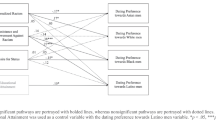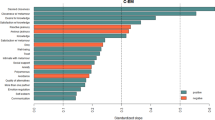Abstract
Existing research posits that young adults navigate the developmental tasks of emerging adulthood, including sexual and romantic relationship formation, in context of geographic and social separation from families of origin. This assumption of independence reflects the ongoing focus on privileged samples to the exclusion of working class, racial/ethnic minority, and immigrant young adults, many of whom live with family through the emerging adult years. This exploratory analysis employs interview data from a racially and socioeconomically diverse sample of 85 college attending emerging adults who live with or proximate to family to explore how families of origin shape interpersonal relationships. Findings show that family members impart both direct and indirect socialization messages that encourage career development over relationship formation. Families also engage in surveillance of emerging adults, applied disproportionately to women. Results are discussed in terms of differences and commonalities of experience across race/ethnicity, nativity, class, and gender, and the salience of family to these processes.
Similar content being viewed by others
References
Allison, R., & Risman, B. J. (2014). It goes hand in hand with the parties: Race, class, and residence in college students’ negotiations of hooking up. Sociological Perspectives, 57, 102–123.
Armstrong, E. A., England, P., & Fogarty, A. C. K. (2012). Accounting for women’s orgasm and sexual enjoyment in college hookups and relationships. American Sociological Review, 77, 435–462.
Arnett, J. J. (2000). Emerging Adulthood: A theory of development from the late teens through the twenties. American Psychologist, 55, 469–480.
Arnett, J. J. (2003). Conceptions of the transition to adulthood among emerging adults in American ethnic groups. New Directions for Child and Adolescent Development, 2003, 63–76.
Arnett, J. J. (2004). Emerging adulthood: The winding road from the late teens through the twenties. New York, NY: Oxford University Press.
Arnold, K. D. (2010). College student development and the hook-up culture. Journal of College and Character, 11, 1–10.
Arnold, A. L., O’Neal, C. W., & Futris, T. G. (2013). Parent-daughter communication and emerging adults’ beliefs about mate selection. Journal of Adult Development, 20, 16–26.
Bay-Cheng, L. Y., Livingston, J. A., & Fava, N. M. (2011). Adolescent girls’ assessment and management of sexual risks: Insights from focus group research. Youth & Society, 43, 1167–1193.
Berntson, M. A., Hoffman, K. L., & Luff, T. L. (2014). College as context: Influences on interpersonal sexual scripts. Sexuality and Culture, 18, 149–165.
Bersamin, M., Todd, M., Fisher, D. A., Hill, D. L., Grube, J. W., & Walker, S. (2008). Parenting practices and adolescent sexual behavior: A longitudinal study. Journal of Marriage & Family, 70, 97–112.
Bogle, K. A. (2008). Hooking up: Sex, dating, and relationships on campus. New York, NY: New York University Press.
Britton, M. L. (2013). Race/ethnicity, attitudes, and living with parents during young adulthood. Journal of Marriage and Family, 75, 995–1013.
Claxton, S. E., & van Dulmen, M. H. M. (2013). Casual sexual relationships and experiences in emerging adulthood. Emerging Adulthood, 1, 138–150.
Crockett, L. J., Bingham, C. R., Chopak, J. S., & Vicary, J. R. (1996). Timing of first sexual intercourse: The role of social control, social learning, and problem behavior. Journal of Youth and Adolescence, 25, 89–111.
Davidson, J. K., Sr., Moore, N. B., Earle, J. R., & Davis, R. (2008). Sexual attitudes and behavior at four universities: Do region, race, and/or religion matter? Adolescence, 43, 189–220.
DeLamater, J. (1987). Gender differences in sexual scenarios. In K. Kelley (Ed.), Females, males, and sexuality: Theories and research (pp. 127–139). Albany, NY: SUNY Press.
Fincham, F. D., & Cui, M. (Eds.). (2011). Romantic relationships in emerging adulthood. New York, NY: Cambridge University Press.
Garneau, C., Olmstead, S. B., Pasley, K., & Fincham, F. D. (2013). The role of family structure and attachment in college student hookups. Archives of Sexual Behavior, 42, 1473–1486.
Hall, N. M., Lee, A. K., & Witherspoon, D. D. (2014). Factors influencing dating experiences among african american emerging adults. Emerging Adulthood, 2, 1–11.
Hamilton, L., & Armstrong, E. A. (2009). Gendered sexuality in young adulthood: Double binds and flawed options. Gender & Society, 23, 589–616.
Hardie, J. H., & Stanik, C. E. (2012). The role of family context in young adulthood: Where we’ve been and where we’re going. In A. Booth, S. L. Brown, N. S. Landale, W. D. Manning, & S. M. McHale (Eds.), Early adulthood in a family context (pp. 245–258). New York, NY: Springer.
Heisler, J. M. (2014). They need to sow their wild oats: Mothers’ recalled memorable messages to their emerging adult children regarding sexuality and dating. Emerging Adulthood, 2, 280–293.
Holman, A., & Sillars, A. (2012). Talk about ‘hooking up’: The influence of college student social networks on nonrelationship sex. Health Communication, 27, 205–216.
Hutchinson, M. K., & Cederbaum, J. A. (2011). Talking to daddy’s little girl about sex: Daughters’ reports of sexual communication and support from fathers. Journal of Family Issues, 32, 550–572.
Katsiaficas, D., Suárez-Orozco, C., & Dias, S. I. (2015). “When do I feel like an adult?” Latino and afro-caribbean immigrant-origin community college students’ conceptualizations and experiences of (emerging) adulthood. Emerging Adulthood, 3, 98–112.
Konstam, V. (2007). Cultural considerations and emerging and young adulthood. In V. Konstam (Ed.), Emerging and young adulthood: Advancing responsible adolescent development (pp. 29–41). Springer: New York.
Lambert, T. A., Kahn, A. S., & Apple, K. J. (2003). Pluralistic ignorance and hooking up. The Journal of Sex Research, 40, 129–133.
Lehr, S. T., Dilorio, C., Dudley, W. N., & Lipana, J. A. (2000). The relationship between parent-adolescent communication and safer sex behaviors in college students. Journal of Family Nursing, 6, 180–196.
Lewis, M. A., Atkins, D. C., Blayney, J. A., Dent, D. V., & Kaysen, D. L. (2013). What is hooking up? Examining definitions of hooking up in relation to behavior and normative perceptions. Journal of Sex Research, 50, 757–766.
Longmore, M. A., Eng, A. L., Giordano, P. C., & Manning, W. D. (2009). Parenting and adolescents’ sexual initiation. Journal of Marriage & Family, 71, 969–982.
Lyons, H., Manning, W. D., Longmore, M. A., & Giordano, P. C. (2014). Young adult casual sexual behavior: Life-course-specific motivations and consequences. Sociological Perspectives, 57, 79–101.
Manago, A. M., Ward, L. M., & Aldana, A. (2015). The sexual experience of latino young adults in college and their perceptions of values about sex communicated by their parents and friends. Emerging Adulthood, 3, 14–23.
Markham, C. M., Lormand, D., Gloppen, K. M., Peskin, M. F., Flores, B., Low, B., & House, L. D. (2010). Connectedness as a predictor of sexual and reproductive health outcomes for youth. Journal of Adolescent Health, 46, S23–S41.
Meier, A., & Allen, G. (2009). Romantic relationships from adolescence to young adulthood: Evidence from the national longitudinal study of adolescent health. The Sociological Quarterly, 50, 308–335.
Morgan, E. M., Thorn, A., & Zurbriggen, E. I. (2010). A longitudinal study of conversations with parents about sex and dating during college. Developmental Psychology, 46, 139–150.
Ovink, S. M., & Kalogrides, D. (2015). No place like home? Familism and latino/a-white differences in college pathways. Social Science Research, 52, 219–235.
Padilla-Walker, L. M., Nelson, L. J., & Knapp, D. J. (2013). “Because I’m still the parent, that’s why!” Parental legitimate authority during emerging adulthood. Journal of Social and Personal Relationships,. doi:10.1177/0265407513494949.
Parkes, A., Henderson, M., Wight, D., & Nixon, C. (2011). Is parenting associated with teenagers’ early sexual risk-taking, autonomy, and relationship with sexual partners? Perspectives on Sexual and Reproductive Health, 43, 30–40.
Parra, A., Oliva, A., & del Carmen Reina, M. (2015). Family relationships from adolescence to emerging adulthood: A longitudinal study. Journal of Family Issues, 36, 2002–2020.
Paul, E. L., & Hayes, K. A. (2002). The casualties of ‘casual’ sex: A qualitative exploration of college students’ hookups. Journal of Social and Personal Relationships, 19, 639–661.
Pew Research Center. (2013). A rising share of young adults live in their parents’ home. Washington, DC: Pew Research Center Social and Demographic Trends project. http://www.pewsocialtrends.org/files/2013/07/SDT-millenials-living-with-parents-07-2013.pdf.
Schwab, J. R., & Syed, M. (2015). Qualitative inquiry and emerging adulthood: Meta-theoretical and methodological issues. Emerging Adulthood, 3, 388–389.
Shulman, S., & Connolly, J. (2013). The challenge of romantic relationships in emerging adulthood: Reconceptualization of the field. Emerging Adulthood, 1, 27–39.
Syed, M., & Mitchell, L. L. (2013). Race, ethnicity, and emerging adulthood: Retrospect and prospects. Emerging Adulthood, 1, 83–95.
Tanner, J. L., Arnett, J. J., & Leis, J. A. (2009). Emerging adulthood: Learning and developing during the first stage of adulthood. In M. C. Smith & T. G. Reio (Eds.), Handbook of research on adult development and learning (pp. 34–67). New York, NY: Routledge.
Trinh, S. L., Ward, L. M., Day, K., Thomas, K., & Levin, D. (2014). Contributions of divergent peer and parent sexual messages to asian american college students’ sexual behaviors. Journal of Sex Research, 51, 208–220.
Yahya, S., & Boag, S. (2014). “My family would crucify me”: The perceived influence of social pressure on cross-cultural and interfaith dating and marriage. Sexuality and Culture, 18, 759–772.
Acknowledgments
This study received no funding.
Author information
Authors and Affiliations
Corresponding author
Ethics declarations
Conflict of interest
Author declares that she has no conflict of interest.
Ethical Approval
This article does not contain any studies with animals performed by any of the authors. All procedures performed in studies involving human participants were in accordance with the ethical standards of the institutional and/or national research committee and with the 1964 Helsinki declaration and its later amendments or comparable ethical standards.
Informed Consent
Informed consent was obtained from all individual participants included in the study.
Rights and permissions
About this article
Cite this article
Allison, R. Family Influences on Hooking Up and Dating Among Emerging Adults. Sexuality & Culture 20, 446–463 (2016). https://doi.org/10.1007/s12119-016-9334-5
Published:
Issue Date:
DOI: https://doi.org/10.1007/s12119-016-9334-5




